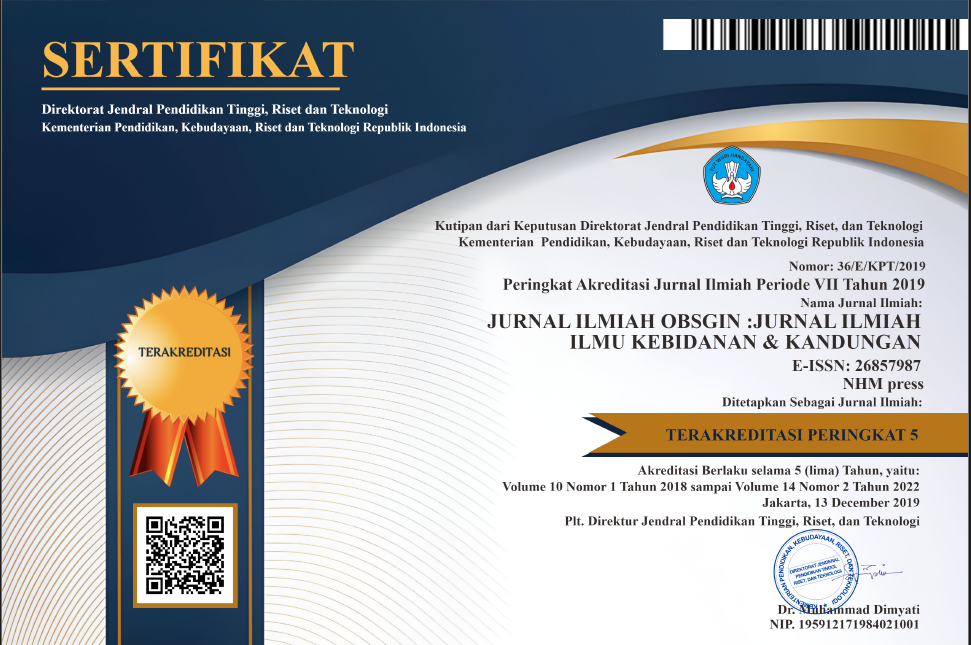PENGARUH PROGRAM BINA KELUARGA BALITA (BKB) TERHADAP TUMBUH KEMBANG ANAK DI KECAMATAN POLEANG PADA MASA PANDEMI COVID -19
Abstract
The process of growth and development is a continuous process starting from conception until the age of 18 years, which follows a certain pattern that is unique to each child. This study aims to analyze the effect of the Toddler Family Development Program (BKB) on Child Development in Poleang District During the Covid-19 Pandemic. This type of research is an observational analytic study using a cross sectional study design. This research was conducted in Poleang Subdistrict, Bombana Regency, Southeast Sulawesi Province with the time of data collection taking place from July to August 2021 involving 105 mothers and children aged 0-5 years with inclusion criteria such as mothers being members of the Family Development group under five and domiciled in research location for the next 6 months. The sampling technique in this study used simple random sampling. Data analysis used the chi square test with the assumption that the p-value 0.05 was considered significant. The results showed that the highest level of education was in the low category with 64 mothers (61%), and the lowest was in the high category with 41 mothers (39%). History of infectious diseases in children, out of 105 respondents (100%), the highest was the healthy category with 86 children (81.9%), and the lowest was the sick category with 19 children (18.1%). Family income, out of 105 respondents (100%), the highest category was the poor category as many as 83 respondents (79%), and the lowest was the moderate category as many as 22 respondents (21%). The nutritional status of children, out of 105 children (100%), the highest was in the good category with 85 children (81%), and the lowest was in the poor category with 20 children (19%). The growth and development of children in the working area of Poleang Health Center, Bombana Regency, Southeast Sulawesi Province is influenced by the level of education, history of childhood infectious diseases, family income and nutritional status of children.
References
Alifariki, L. O. (2020). Gizi Anak dan Stunting. Yogyakarta. Penerbit LeutikaPrio.
Aprilina, S., Keb, M., Rahayu, D. T., ST, S., Yuliawati, D., ST, S., Raidanti, D., SiT, S., Purwandari, E. S., & Maringga, E. G. (2020). Adaptasi Kebiasaan Baru dalam Kebidanan di Era Pandemi Covid-19.
Ariani, A., & Yosoprawoto, M. (2013). Usia anak dan pendidikan ibu sebagai faktor risiko gangguan perkembangan anak. Jurnal Kedokteran Brawijaya, 27(2), 118–121.
Bridges, M., Cohen, S. R., McGuire, L. W., Yamada, H., Fuller, B., Mireles, L., & Scott, L. (2012). Bien educado: Measuring the social behaviors of Mexican American children. Early Childhood Research Quarterly, 27(3), 555–567.
Cassiano, R. G. M., Gaspardo, C. M., & Linhares, M. B. M. (2016). Prematurity, neonatal health status, and later child behavioral/emotional problems: a systematic review. Infant Mental Health Journal, 37(3), 274–288.
Chamidah, A. N. (2009a). Deteksi dini gangguan pertumbuhan dan perkembangan anak. Jurnal Pendidikan Khusus, 5(2), 83–93.
Chamidah, A. N. (2009b). Pentingnya Stimulasi Dini Bagi Tumbuh Kembang Otak Anak. Yogyakarta: Jurusan Pendidikan Luar Biasa UNY.
Checkley, W., Buckley, G., Gilman, R. H., Assis, A. M. O., Guerrant, R. L., Morris, S. S., Mølbak, K., Valentiner-Branth, P., Lanata, C. F., & Black, R. E. (2008). Multi-country analysis of the effects of diarrhoea on childhood stunting. International Journal of Epidemiology, 37(4), 816–830.
Dewi, R. V. K. (2021). Menjadi Orang Tua Tangguh Di Masa Pandemi Dengan Pendekatan Dukungan Psikologis Awal (DPA). Masa Depan Kampus Merdeka & Merdeka Belajar: Sebuah Bunga Rampai Dosen, 93.
Endarwati, S., & Haqiqi, C. (2018). Minat Ibu Melakukan Stimulasi Tumbuh Kembang Anak Usia 1-5 Tahun Desa Maron Kecamatan Banyakan Kabupaten Kediri. Jurnal Kebidanan, 7(1), 38–43.
Gunawan, G., Fadlyana, E., & Rusmil, K. (2016). Hubungan status gizi dan perkembangan anak usia 1-2 tahun. Sari Pediatri, 13(2), 142–146.
Kusnan, A., & Rangki, L. (2019). Faktor determinan proksi kejadian kematian neonatus di wilayah kerja Dinas Kesehatan Kabupaten Buton Utara. Berita Kedokteran Masyarakat, 35(4), 131–138.
Muljati, S., Hapsari, D., & Budiman, B. (2005). Gangguan pertumbuhan dan defisit berat badan pada balita di perkotaan dan pedesaan. GIZI INDONESIA, 28(2).
Nurmaliza, N., & Herlina, S. (2019). Hubungan Pengetahuan dan Pendidikan Ibu terhadap Status Gizi Balita. Jurnal Kesmas Asclepius, 1(2), 106–115.
Nursalam, R. S., & Utami, S. (2005). Asuhan Keperawatan Bayi dan Anak (untuk perawat dan bidan). Jakarta: Salemba Medika.
Preedy, V. R. (2012). Tea in health and disease prevention. Academic Press.
Puspitasari, E. (2019). Deteksi Dini Tumbuh Kembang Anak di Tempat Penitipan Anak Parkland Widya Husada Semarang. Jurnal Ilmu Dan Teknologi Kesehatan, 10(1).
Qomari, S. N., & Maduratna, E. S. (2020). Pelatihan Dasar Deteksi Dini Pertumbuhan dan Perkembangan Anak Bagi Guru Ra Al-Ikhwan Bangkalan. JURNAL PARADIGMA (PEMBERDAYAAN DAN PENGABDIAN KEPADA MASYARAKAT), 2(2), 24–29.
Rangki, Alifariki L.O, H., Rahmawati, R., & Sukurni, Salma, W. . (2020). Risk Factors of Stunting in Children Age 24-59 Months Old. Media Keperawatan Indonesia, 3(1), 10–16.
Rohimah, E., Kustiyah, L., & Hernawati, N. (2015). Pola konsumsi, status kesehatan dan hubungannya dengan status gizi dan perkembangan balita. Jurnal Gizi Dan Pangan, 10(2).
Ulfa, M. (2018). Analisa Deteksi Dini dan Stimulasi Peerkembangan Anak Usia Prasekolah. Jurnal Ilmiah Ilmu Kesehatan, 6(3), 200–209.











